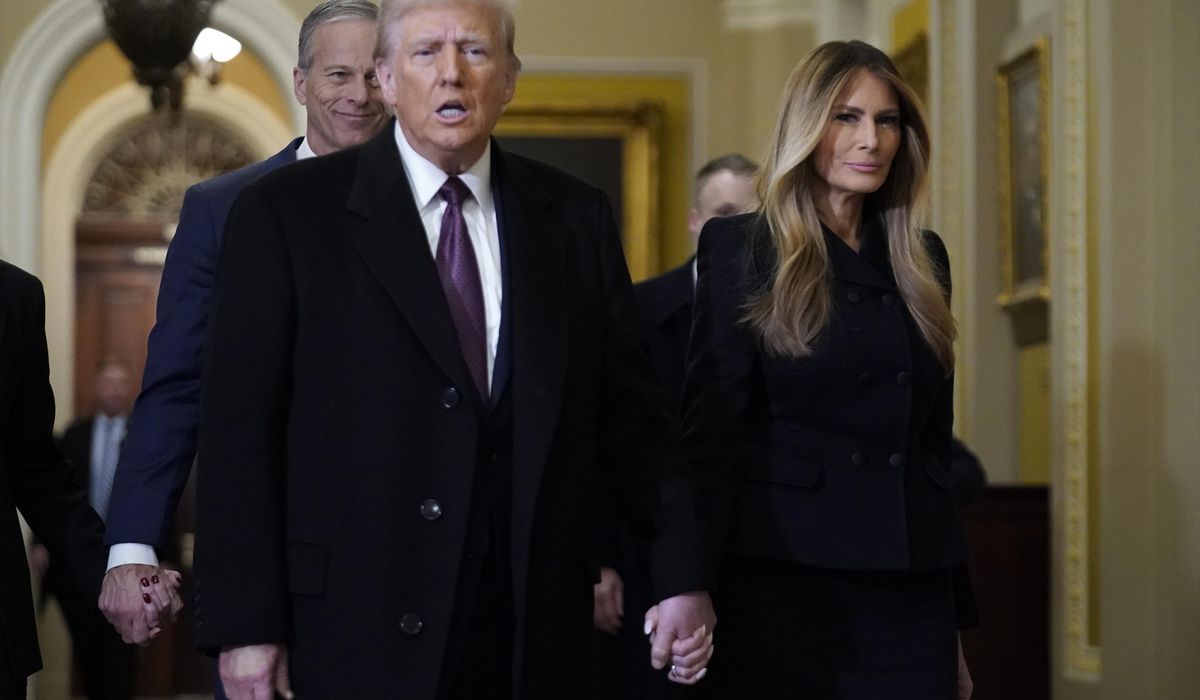


President-elect Donald Trump on Wednesday made his first visit to the Capitol of the new year and new Congress, meeting with Senate Republicans to discuss the party’s legislative agenda.
The visit came as Republicans have been united on their broad goals — to secure the border, restore American energy dominance, cut taxes and rein in spending — but divided on the best strategy for passage given their narrow House and Senate majorities.
The debate centers on whether to package all of those priorities into a single bill, which would take several months to produce, or to quickly move some of the border and energy provisions first.
“We’re looking at the one bill versus two bills and whatever it is, it doesn’t matter,” Mr. Trump said as he arrived at the Capitol. “We’re going to get the result and we’re going to Make America Great Again, and we’ll see you in a little while.”
Sen. Lindsey Graham, South Carolina Republican, made the case for moving quickly with a border bill first, saying, “We should put points on the board, secure our border and have a sense of urgency with that.”
Mr. Graham is chair of the Senate Budget Committee, which will play a key role because Republicans will use the budget reconciliation process to advance their agenda by skirting a Senate filibuster and passing the legislation with only Republican votes if Democrats object.
Mr. Trump has said he prefers “one big, beautiful bill” but is open to the two-bill approach. He has suggested congressional Republicans choose whichever option can get the votes needed for passage but also get done quickly.
Senate Republicans made the case to Mr. Trump that Congress should give him an early win by providing funding for the border wall he was unable to complete in his first term and the Biden administration stopped building, as well as money for other border and immigration enforcement tools he plans to reinstate through executive actions.
“Border security is a huge issue for our country — and not just Republicans — but that’s an absolute priority that we get it done,” Sen. John Hoeven, North Dakota Republican, said. “That’s why we’re talking about two bills versus getting it all done in one.”
Still, Mr. Hoeven said he appreciated Mr. Trump’s flexibility on strategy, saying his goal is to get it all done as expeditiously as possible is “right on the money.”
“If the only way to get it done with the House is all one big, beautiful bill, that’s okay, too,” he said.
Sen. Tommy Tuberville, Alabama Republican, said that whatever the outcome, they need to quickly settle on a plan.
“We’ve got to do something,” he said. “We can’t just sit around and twiddle our thumbs.”
Republicans have also begun debating priorities that will need to be included in any legislation to get enough votes to pass both chambers. The House has a paper-thin majority and the Senate’s is not much bigger.
One item that Senate Republicans have been discussing but has not been on the House’s priority list is increasing defense spending.
“We’re working on investing in improvements to military readiness that will help restore American strength so that we can deter our adversaries and keep the peace,” Senate Majority Leader John Thune, South Dakota Republican, said in a floor speech previewing his conference’s reconciliation priorities.
While Republicans have shut Democrats out of the reconciliation process, that hasn’t stopped them from weighing in with their opinions.
Senate Minority Leader Charles E. Schumer, New York Democrat, said it’s “obscene” that Republicans are prioritizing an extension of the 2017 tax cuts, which he called “a disaster.”
“Instead of working in a bipartisan way to put the needs of working Americans first, Republicans are getting ready to use the reconciliation process to reward the richest Americans and give more tax breaks to America’s biggest corporations,” he said.
• Lindsey McPherson can be reached at lmcpherson@washingtontimes.com.
• Alex Miller can be reached at amiller@washingtontimes.com.
